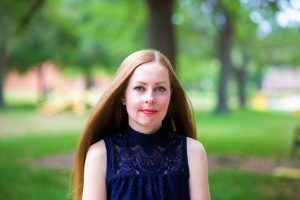
Earning a college degree is always a significant accomplishment. But for Holly Baker, who is the first in her family to earn a not only a bachelor’s degree, but also a master’s degree, this occasion is all the more special.
While many young children dream of becoming a doctor, astronaut or teacher, Baker had dreams of becoming a writer and seeing the world. Some of her earliest memories involved exploring historic sites with her mother. Baker’s mother wasn’t afforded the opportunity to finish school past eighth grade, and she was adamant that her daughter’s life would turn out differently.
“She used to pick oranges, she was a waitress, she usually had two or three jobs,” said Baker. “But when I was little, she used to say ‘Honey, you better go to school so you don’t have to struggle like this.’”
A 2010 study by the Department of Education showed that nearly 50 percent of students have parents who never attended college. Statistics from The National Center for Education Statistics show that among freshmen, 30 percent are first-generation college students.
For any student, navigating through things like class schedules and financial aid can provide challenges. For first-generation students, securing aid for school without help from a parent who understands the process can prove even more intimidating. Baker recalls navigating the sometimes overwhelming process of completing the financial aid application process and entering into the world of higher learning.
While her family members didn’t have a frame of reference to offer advice, Baker says that she found a support system within the UCF community. Encouraging conversations with faculty and other students helped to keep her motivated during some of college’s most stressful moments.
“Being a first-generation college student, you need a support system that a lot of people get within their family that you may not get,” said Baker. “That’s why the UCF History Department was a big deal for me. Knowing other people who have been where you’ve been is helpful.”
Baker sought out internships and other opportunities where she could apply what she was learning in an out-of-classroom setting. She sought guidance from her advisor, Dr. Robert Cassanello, on what steps she could take to gain necessary skills while still in school. With a history of producing podcasts, and an Emmy award under his belt, Cassanello listened to Baker as she shared her goals and offered her valuable advice.
Baker has since gained hands-on experience working on podcasts for Florida Frontiers, The Florida Historical Quarterly, Knights Historycast and the Zora Neale Hurston Festival of the Arts and Humanities. She now writes scripts, narrates podcasts, and edits interviews as an official radio and podcast producer for the UCF History Department, and her Florida Frontiers episodes can be heard on NPR stations across the state.
“As a child, I watched Ken Burns documentaries and dreamed of interviewing people about history and making documentaries someday,” said Baker. “While the written word is a great way to learn about history, there is something about podcasting that is magical. The sound of the human voice and the storytelling opportunities podcasts provide allows for a rare emotional connection for the audience.”
With B.A. and M.A. history degrees from UCF under her belt, Baker is ready and eager to embark on her career as a public historian. Beginning in February, she will join the Florida Historical Society as Public History Coordinator and Manager of the Brevard Museum of History and Natural Science in Cocoa. Her friends and followers at UCF can count on hearing more from her, as she will continue producing podcasts for the UCF History Department and creating new episodes for Frontiers Frontiers, which airs locally on 90.7 WMFE-FM.